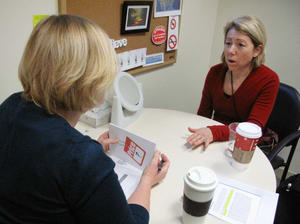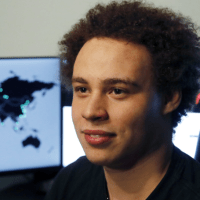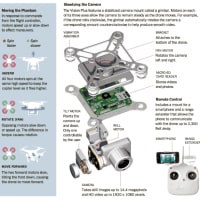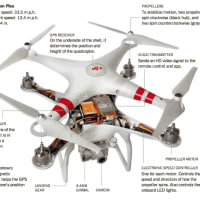Singing Therapy Helps Stroke Patients Speak Again
シンギング・セラピーが脳梗塞患者の発話障害を改善する
by RICHARD KNOX
December 26, 2011
訓練すればいろいろな部位が失われた部位の機能を補完することは、よく知られている。母が同様に脳梗塞で言葉を失っているので他人事とは思えない。日本にも早く普及させて欲しい。

Laurel Fontaine, 16, (left) and her twin sister Heather. When Laurel was 11 years old, she suffered a stroke that destroyed 80 percent of the left side of her brain. The singing therapy helped her regain the ability to speak. ローレル・フォンテイン16歳(左)と彼女の双子姉妹のヒーサー。 ローレルが11歳の時、脳梗塞になり、脳の左半分の80%が壊死した。 歌唱療法(シンギング・セラビー)で再び話せるようになっている。
Debra Meyerson was hiking near Lake Tahoe 15 months ago when a stroke destroyed part of the left side of her brain, leaving her literally speechless. It happens to more than 150,000 Americans a year. But now Meyerson is learning to talk again through an approach that trains the undamaged right side of her brain to "speak." Specifically, it's a region that controls singing.
デブラ・メイヤーソンは15か月前にレイク・タホの近くにハイキングに出かけたときに脳の左側を脳梗塞が襲い、実質的に話す機能を失ってしまった。 こういう事例は毎年アメリカだけで15万件以上起きている。
しかし、今メイヤーソンは助かった右側の脳を訓練することをで、話す能力を再び獲得しようとしている。 訓練しているのは、右脳の特に歌をつかさどる分野である。
For more than 100 years, it's been known that people who can't speak after injury to the speech centers on the left side of the brain can sing. In the 1970s, Boston researchers started to use a sort of "singing therapy" to help stroke survivors speak again. However, it never caught on much – perhaps because a lot of therapists, not to mention patients, weren't comfortable singing what they wanted to say. And back then, the science wasn't advanced enough to show the actual changes in the brain that result from the therapy.
100年以上も前から、脳の左側の言語分野を損傷して話せなくなった人でも歌を歌えることは知られていた。 1970年代に、ボストン研究者達は、言語野を損傷した脳梗塞の生存者を再び会話が出来るようにするために、いわゆる「歌唱療法」を実施している。 しかしながら、この治療法はなかなか広がりを見せなかった・・・多分それは、患者はもとより治療にあたる人の多くが、自分の言いたいことを歌うということに居心地の悪さを感じていたからだろう。 そして、当時は、まだその治療効果で脳が実際に変化していることを示せるほどに科学が発達していなかったのである。
That's changing fast. しかし、その変化は実は早く起きているのである。
Congresswoman Gabrielle Giffords, who has had a version of "singing therapy," astounded everyone by her ability to speak again – albeit so far in single words and short phrases. Nearly a year ago, a would-be assassin's bullet tore through the speech center in Giffords' left brain.
ガブリエル・ギフォード議員は「歌唱療法」の一種を受けて、今のところは単語や短いフレーズであるが、再び話せるようになり、周囲を驚かせている。 約1年前、殺人未遂犯人の銃弾が彼女の左脳の言語野に命中したのだ。
Singing Sessions 歌唱療法
Less visibly, an NIH-funded study at the Beth Israel Deaconess Medical Center in Boston may be the first rigorous trial of singing therapy. They call it melodic intonation therapy. Post-stroke patients are assigned to a form of conventional speech therapy or to singing therapy. They undergo 90 minutes of treatment a day for 15 weeks.
目立たないが、アメリカ国立衛生研究所が資金援助しているボストンのベス・イスラエル・ディーコンネス・メディカル・センターでの研究において、初めてキチンとした形で「歌唱療法」を実施された。 彼らは、それをメロディック・イントネーション・セラピー(メロディ抑揚療法)と呼んでいる。 脳梗塞になった患者には通常の発話療法、或いはこの「歌唱療法」が適用された。 彼らは一日90分で15週間、その治療を受けている。

Debra Meyerson participates in a singing therapy at the Beth Israel Deaconess Medical Center in Boston, MA. デブラ・メイヤーソンはマサチューセッツ州のボストンのベス・イスラエル・ディーコネス・メディカル・センターで歌唱療法に参加している。
Meyerson suffered a stroke 15 months ago and is now beginning to talk again. Debra Meyerson, 54, is a volunteer in that study. Her aphasia is a cruel twist of fate. Meyerson is an expert in gender and race relations who was a dynamic and popular speaker before her stroke. After a year of conventional speech therapy, she couldn't speak more than a word or two.
メイヤーソンは15か月前に脳梗塞に見舞われ、今は再び話しはじめている。 デブラ・メイヤーソン54歳はこの研究に自主的に参加を決めた。 彼女の失語症は彼女に過酷な運命をもたらした。 メイヤーソンは性別と人種の関係の専門家で脳梗塞に襲われる前は雄弁で人気のある講演者であった。 一年もの通常の発話治療を受けたが、未だに一言も話せないという有様だった。
When NPR sat in on one of her therapy sessions recently, Meyerson still struggled to speak even the simplest phrases. But she's beginning to talk again. "If you go to a restaurant and the server asks if you'd like something before your main dish, you might choose something like this," therapist Andrea Norton says, showing Meyerson a picture of a salad. Then Norton sings the word "salad," intoning the syllables on a minor third – the tune every child knows from the taunt "nyah-nyah! nyah-nyah!" Norton slows everything down. That's critical because the right side of Meyerson's brain – the singing part that's being retrained to "speak" – is good at melody and pitch, but it's not as fast as the left-sided language center, called Broca's area. It's also not as good at the rhythmic components of speech. That's why Norton taps Meyerson's left hand (controlled by the right brain). The tapping entrains the rhythms of speech and engages the motor nerves needed to produce speech in Meyerson's mouth and throat.
最近、NPRが彼女の治療のある回に立ち会ったが、メイヤーソンは未だに、ごく簡単なフレーズでさえ話すのに苦労していた。 しかし、彼女は確実に話せるようになりつつある。 「もしレストランに言って、給仕がメインディッシュの前に何を食べるか聞いてきたら、このようにして選ぶでしょう。」とサラダの写真をメイヤーソンに見せながらアンドレア・ノートンは話した。 ノートンは「サラダ」という言葉を音節に短三度の翼用をつけて歌う ・・・ 子供たちがからかう言葉の「ニャー・ニャー! ニャー・ニャー!」という音調で。
ノートンは全てをゆっくり歌う。 これはメイヤーソンの右側の脳の“歌の野”が「話す」能力を訓練して獲得していくのに非常に重要になる、なぜなら、この部分の脳は旋律やリズムは得意だが、左側の脳のブローカ野(運動性言語中枢)と呼ばれる言語中枢ほど早く反応することができないからだ。
同様に、発話のリズムについても不得意である。 それゆえ、ノートンはメイヤーソンの左手(右脳が司る)をトントンと叩いている。 このトントンとリズムよく叩くことで、発話のリズムを伝えるとともに、メイヤーソンの口と喉に発話させるのに必要な運動神経を連関させているのである。
Then she shifts to a different phase – bridging the gap between singing and speaking. First Norton has Meyerson sing the phrase "Would you pour me a glass, please?" Next the therapist says it with exaggerated diction that's in between singing and normal speech. Then, gratifyingly, Norton speaks the sentence. "Would you pour me a glass, please?" she says. "Nice!" Norton says. Watching this laborious process, you might not appreciate the remarkable thing that's going on inside the brains of patients like Meyerson. The Harvard team has evidence that melodic intonation therapy actually remolds the brain.
そこで、彼女は次の段階に移行する・・つまり歌と発話のギャップを埋めていくのだ。 まず、ノートンはメイヤーソンにフレーズを歌わせる「グラスに水を注いでくださる?」 次に療法士が通常の発話と歌の中間ぐらいの大袈裟な話し方で繰り返す。 その後、ノートンは朗らかにセンテンスを話す。「ウッド・ユー・ポア・ミー・ア・グラス プリーズ」とメイヤーソンが話す。 「ナイス!」とノートンが言う。
この骨の折れる療法の過程を見て、メイヤーソンのような患者の脳内に顕著な変化が起きているとは認識しないかも知れないが、ハーバートの研究チームは、このメロディ抑揚療法が実際に脳に変化をもたらしている証拠を発見している。
Growing Nerves 神経の成長
One of the clearest examples is Laurel Fontaine, a 16-year-old sophomore at North Attleborough High School in southeastern Massachusetts. A little more than four years ago, when Laurel was 11, she suffered a devastating stroke – unusual in a child, but not as rare as you might think.
Laurel's stroke destroyed 80 percent of the left side of her brain. One of her doctors says it's the biggest stroke he's ever seen.
もっとも顕著な例の一つが、ローレル・フォンテイン16歳、マサチューセッツ州の南東部のノース・アテルボロー高校の2年生だ。 4年少し前、彼女が11歳の時、酷い脳梗塞に見舞われた。 子供にはめったに発症しないのだが、意外とみんなが思うほど珍しいことではないのである。 ローレルの脳梗塞は、彼女の左脳の80%を麻痺させてしまった。 彼女を診た医師の一人は、これまで見たことのない酷い脳梗塞だったと話している。

Laurel and her twin sister Heather bake together at their home in North Attleboro, Mass., on Friday, December 23, 2011. ローレルと彼女の双子姉妹のヒーサーがマサチューセッツのノースアテルボローにある実家で一緒にパンを焼いている。
"My doctor told me I'm not going to talk, I'm not going to walk, I'm not going to, like, do anything...press buttons...ever," she says. After a year of conventional speech therapy, Laurel could speak only a word or two at a time. Then her mother persuaded the Beth Israel Deaconess researchers to let Laurel enroll in their research project. The singing therapy lasted only about four months, but it's had permanent effects. Though Laurel still struggles sometimes to find the words she wants, she doesn't have to sing them out loud. "I'm singing in my head and talking out loud without singing," she says between classes. "I do it, like, really quick."
「医者は私に話せなくなる、歩けなくなる、ボタンもオスことも出来なくなる・・それもずっと、と言ったわ」と彼女は話す。 1年の通常の発話療法では、彼女は一回に一言か二言しか話せなかった。 この歌唱療法はまだ4か月だが、永続的な効果が見られている。 ローレルはまだ、時々話したい言葉を見つけるのに苦労はしているが、彼女は、その言葉を全部大声で歌うことはしない。 「私は心の中で歌っているの、そしてメロディをつけずに大きな声で話すの、そしてそれを本当に短い時間でやるのよ。」と授業の合間に話してくれた。
Laurel offered the researchers a big bonus – an identical twin sister named Heather. So the researchers could use MRI scans to compare the girls' brains. They focused on a structure on the right side that's important for singing. Before Laurel began melodic intonation therapy, that structure was smaller in her brain compared to Heather's. That's probably because she hadn't been doing anything with her voice for a whole year. But during therapy, scans showed that nerve fibers in Laurel's right-sided singing center actually grew – they clearly multiplied and thickened. With therapy, those nerve bundled got bigger than the corresponding region in Heather's brain.
ローレルの治療は研究者に大きな副次的成果をもたらした・・・・彼女には一卵性双生児のヒーサーがいたのだ。 研究者達は姉妹の脳をMRIでスキャンすることで、変化を比較することができた。 彼等は歌うのに重要な右側の脳の構造に焦点をあてた。 ローレルがメロディ抑揚療法を始める前は、その脳はヒーサーに比較して小さく委縮していたが、それは多分一年もの間声を出すことについて何もしなかった結果だろうと思われる。 しかし、治療の間に、彼女の脳のスキャンは明らかにローレルの右脳の歌の野の神経線維が成長していた。 そして、それらは明らかに多層に伸び厚みを増しており、治療で、これらの神経線維束が、ヒーサーのそれよりも太くなっていたのだ。
Dr. Gottfried Schlaug, who heads the study, says that's exactly what he was looking for. "It is the perfect confirmation," he says. "Basically, the hardware of the system really changed to support this increased vocal output." And Laurel continues to improve. It's possible, Schlaug says, that when Laurel is in her 20s, someone who didn't know any better would never suspect she ever had a massive stroke that left her unable to speak.
この研究の長である、ゴットフリード・シュラグ博士は、これこそが彼が求めていたものだと話した。「完全な形で成果を確認することができた。 基本的にこのシステムの機器がこの発話増加のサポートを本当に一変させた。」と彼は言う。 そしてローレルは段々良くなり続けている。 彼女が20代になって、かつてのことを知らない人が、彼女が酷い脳梗塞で言葉を失ったことがあると決して気づかないということも有り得る話だという。
The Age Factor 年齢の要素
But how much of her remarkable recovery is because Laurel was so young when her brain was injured? Schlaug says her youth was definitely a factor. "However, we know that patients even in their 80s can show plastic changes to their brain, can show adaptations," he says. It just may take longer. And, as with learning a foreign language at a later age, an older brain may never get to the same level. From his work with older patients Schlaug says a surprising amount of recovery is possible. He also reports good results working with autistic children and people with Parkinson's disease who have trouble speaking.
しかし、彼女が脳梗塞に見舞われたとき若かったというのも大きな改善の理由ではないのですか? シュラーク博士は若さも間違いなく要素の一つだと言う。 「しかし、我々は80歳の患者でも脳が変化しているのを見ているし、彼らは適応することが出来ることを示している。」と彼は言う。 それは若い人に比べて時間がかかるだけのことで、年齢がいってから外国語を習得するのと同じで、歳寄りの脳は決して若い人の脳と同じレベルになることはない。 彼の老人の患者を通じての経験から、シュラーク博士は老人でも驚くほどの改善が可能だと言う。 彼は自閉症の子供たちや、言語に障害が出ているパーキンソン病の人に関しても良い結果が出ていると報告している。
Schlaug thinks singing therapy can be enhanced by simultaneously stimulating the brain with painless, low-voltage electricity – and one day, possibly, by drugs. For now, it takes an incredible amount of willpower. Meyerson can testify to that. "Recovery is long and hard," Meyerson told Laurel Fontaine recently when therapist Andrea Norton brought them together. "Well, it's hard at first," Laurel told the older woman. "But you can get used to it. I'm getting better all the time. Don't get frustrated." "Yes...yes...thank you!" Meyerson replied, clearly moved by Laurel's example.
シュラーク博士は、この歌唱療法は無痛の定電圧電気刺激を同時に与えることで効果を倍増できると考えている、そして多分いつの日か効果の上がる薬もでるだろう。 それまでは、この療法の継続には強い意志力を必要とする。 メイヤーソンがそのことを証明している。 療法士のアンドレア・ノートンが二人を引き合わせたとき、「回復の道のりは長く、困難だ」とメイヤーソンは、ローレル・フォンテインに話している。 「最初はきついけど・・・・ だけど、それにも慣れるわ。 私は常に良くなりつつあるんだもの。 イライラしないことが大事。」とローレルがメイヤーソンに話すと、「そうね、そうよね 有難う!」明らかにローレルの回復事例に励まされてメイヤーソンは答えた。
Clearly Laurel's a star and Deb Meyerson has a long way to go. But she's determined to get there. By next Labor Day – the second anniversary of her stroke – Meyerson wants to start public speaking again, this time as an advocate for better stroke care.
ローレルは明らかに希望の星を見出しており、一方のメイヤーソンは、まだ道のりは長い。 しかし、彼女は前に進むことを決意した。 次のレイバーデー(脳梗塞から二年目のその日) メイヤーソンは講演を再開することを考えている。 ただ、今回は脳梗塞の良いケアの仕方について話すつもりだ。
シンギング・セラピーが脳梗塞患者の発話障害を改善する
by RICHARD KNOX
December 26, 2011
訓練すればいろいろな部位が失われた部位の機能を補完することは、よく知られている。母が同様に脳梗塞で言葉を失っているので他人事とは思えない。日本にも早く普及させて欲しい。

Laurel Fontaine, 16, (left) and her twin sister Heather. When Laurel was 11 years old, she suffered a stroke that destroyed 80 percent of the left side of her brain. The singing therapy helped her regain the ability to speak. ローレル・フォンテイン16歳(左)と彼女の双子姉妹のヒーサー。 ローレルが11歳の時、脳梗塞になり、脳の左半分の80%が壊死した。 歌唱療法(シンギング・セラビー)で再び話せるようになっている。
Debra Meyerson was hiking near Lake Tahoe 15 months ago when a stroke destroyed part of the left side of her brain, leaving her literally speechless. It happens to more than 150,000 Americans a year. But now Meyerson is learning to talk again through an approach that trains the undamaged right side of her brain to "speak." Specifically, it's a region that controls singing.
デブラ・メイヤーソンは15か月前にレイク・タホの近くにハイキングに出かけたときに脳の左側を脳梗塞が襲い、実質的に話す機能を失ってしまった。 こういう事例は毎年アメリカだけで15万件以上起きている。
しかし、今メイヤーソンは助かった右側の脳を訓練することをで、話す能力を再び獲得しようとしている。 訓練しているのは、右脳の特に歌をつかさどる分野である。
For more than 100 years, it's been known that people who can't speak after injury to the speech centers on the left side of the brain can sing. In the 1970s, Boston researchers started to use a sort of "singing therapy" to help stroke survivors speak again. However, it never caught on much – perhaps because a lot of therapists, not to mention patients, weren't comfortable singing what they wanted to say. And back then, the science wasn't advanced enough to show the actual changes in the brain that result from the therapy.
100年以上も前から、脳の左側の言語分野を損傷して話せなくなった人でも歌を歌えることは知られていた。 1970年代に、ボストン研究者達は、言語野を損傷した脳梗塞の生存者を再び会話が出来るようにするために、いわゆる「歌唱療法」を実施している。 しかしながら、この治療法はなかなか広がりを見せなかった・・・多分それは、患者はもとより治療にあたる人の多くが、自分の言いたいことを歌うということに居心地の悪さを感じていたからだろう。 そして、当時は、まだその治療効果で脳が実際に変化していることを示せるほどに科学が発達していなかったのである。
That's changing fast. しかし、その変化は実は早く起きているのである。
Congresswoman Gabrielle Giffords, who has had a version of "singing therapy," astounded everyone by her ability to speak again – albeit so far in single words and short phrases. Nearly a year ago, a would-be assassin's bullet tore through the speech center in Giffords' left brain.
ガブリエル・ギフォード議員は「歌唱療法」の一種を受けて、今のところは単語や短いフレーズであるが、再び話せるようになり、周囲を驚かせている。 約1年前、殺人未遂犯人の銃弾が彼女の左脳の言語野に命中したのだ。
Singing Sessions 歌唱療法
Less visibly, an NIH-funded study at the Beth Israel Deaconess Medical Center in Boston may be the first rigorous trial of singing therapy. They call it melodic intonation therapy. Post-stroke patients are assigned to a form of conventional speech therapy or to singing therapy. They undergo 90 minutes of treatment a day for 15 weeks.
目立たないが、アメリカ国立衛生研究所が資金援助しているボストンのベス・イスラエル・ディーコンネス・メディカル・センターでの研究において、初めてキチンとした形で「歌唱療法」を実施された。 彼らは、それをメロディック・イントネーション・セラピー(メロディ抑揚療法)と呼んでいる。 脳梗塞になった患者には通常の発話療法、或いはこの「歌唱療法」が適用された。 彼らは一日90分で15週間、その治療を受けている。

Debra Meyerson participates in a singing therapy at the Beth Israel Deaconess Medical Center in Boston, MA. デブラ・メイヤーソンはマサチューセッツ州のボストンのベス・イスラエル・ディーコネス・メディカル・センターで歌唱療法に参加している。
Meyerson suffered a stroke 15 months ago and is now beginning to talk again. Debra Meyerson, 54, is a volunteer in that study. Her aphasia is a cruel twist of fate. Meyerson is an expert in gender and race relations who was a dynamic and popular speaker before her stroke. After a year of conventional speech therapy, she couldn't speak more than a word or two.
メイヤーソンは15か月前に脳梗塞に見舞われ、今は再び話しはじめている。 デブラ・メイヤーソン54歳はこの研究に自主的に参加を決めた。 彼女の失語症は彼女に過酷な運命をもたらした。 メイヤーソンは性別と人種の関係の専門家で脳梗塞に襲われる前は雄弁で人気のある講演者であった。 一年もの通常の発話治療を受けたが、未だに一言も話せないという有様だった。
When NPR sat in on one of her therapy sessions recently, Meyerson still struggled to speak even the simplest phrases. But she's beginning to talk again. "If you go to a restaurant and the server asks if you'd like something before your main dish, you might choose something like this," therapist Andrea Norton says, showing Meyerson a picture of a salad. Then Norton sings the word "salad," intoning the syllables on a minor third – the tune every child knows from the taunt "nyah-nyah! nyah-nyah!" Norton slows everything down. That's critical because the right side of Meyerson's brain – the singing part that's being retrained to "speak" – is good at melody and pitch, but it's not as fast as the left-sided language center, called Broca's area. It's also not as good at the rhythmic components of speech. That's why Norton taps Meyerson's left hand (controlled by the right brain). The tapping entrains the rhythms of speech and engages the motor nerves needed to produce speech in Meyerson's mouth and throat.
最近、NPRが彼女の治療のある回に立ち会ったが、メイヤーソンは未だに、ごく簡単なフレーズでさえ話すのに苦労していた。 しかし、彼女は確実に話せるようになりつつある。 「もしレストランに言って、給仕がメインディッシュの前に何を食べるか聞いてきたら、このようにして選ぶでしょう。」とサラダの写真をメイヤーソンに見せながらアンドレア・ノートンは話した。 ノートンは「サラダ」という言葉を音節に短三度の翼用をつけて歌う ・・・ 子供たちがからかう言葉の「ニャー・ニャー! ニャー・ニャー!」という音調で。
ノートンは全てをゆっくり歌う。 これはメイヤーソンの右側の脳の“歌の野”が「話す」能力を訓練して獲得していくのに非常に重要になる、なぜなら、この部分の脳は旋律やリズムは得意だが、左側の脳のブローカ野(運動性言語中枢)と呼ばれる言語中枢ほど早く反応することができないからだ。
同様に、発話のリズムについても不得意である。 それゆえ、ノートンはメイヤーソンの左手(右脳が司る)をトントンと叩いている。 このトントンとリズムよく叩くことで、発話のリズムを伝えるとともに、メイヤーソンの口と喉に発話させるのに必要な運動神経を連関させているのである。
Then she shifts to a different phase – bridging the gap between singing and speaking. First Norton has Meyerson sing the phrase "Would you pour me a glass, please?" Next the therapist says it with exaggerated diction that's in between singing and normal speech. Then, gratifyingly, Norton speaks the sentence. "Would you pour me a glass, please?" she says. "Nice!" Norton says. Watching this laborious process, you might not appreciate the remarkable thing that's going on inside the brains of patients like Meyerson. The Harvard team has evidence that melodic intonation therapy actually remolds the brain.
そこで、彼女は次の段階に移行する・・つまり歌と発話のギャップを埋めていくのだ。 まず、ノートンはメイヤーソンにフレーズを歌わせる「グラスに水を注いでくださる?」 次に療法士が通常の発話と歌の中間ぐらいの大袈裟な話し方で繰り返す。 その後、ノートンは朗らかにセンテンスを話す。「ウッド・ユー・ポア・ミー・ア・グラス プリーズ」とメイヤーソンが話す。 「ナイス!」とノートンが言う。
この骨の折れる療法の過程を見て、メイヤーソンのような患者の脳内に顕著な変化が起きているとは認識しないかも知れないが、ハーバートの研究チームは、このメロディ抑揚療法が実際に脳に変化をもたらしている証拠を発見している。
Growing Nerves 神経の成長
One of the clearest examples is Laurel Fontaine, a 16-year-old sophomore at North Attleborough High School in southeastern Massachusetts. A little more than four years ago, when Laurel was 11, she suffered a devastating stroke – unusual in a child, but not as rare as you might think.
Laurel's stroke destroyed 80 percent of the left side of her brain. One of her doctors says it's the biggest stroke he's ever seen.
もっとも顕著な例の一つが、ローレル・フォンテイン16歳、マサチューセッツ州の南東部のノース・アテルボロー高校の2年生だ。 4年少し前、彼女が11歳の時、酷い脳梗塞に見舞われた。 子供にはめったに発症しないのだが、意外とみんなが思うほど珍しいことではないのである。 ローレルの脳梗塞は、彼女の左脳の80%を麻痺させてしまった。 彼女を診た医師の一人は、これまで見たことのない酷い脳梗塞だったと話している。

Laurel and her twin sister Heather bake together at their home in North Attleboro, Mass., on Friday, December 23, 2011. ローレルと彼女の双子姉妹のヒーサーがマサチューセッツのノースアテルボローにある実家で一緒にパンを焼いている。
"My doctor told me I'm not going to talk, I'm not going to walk, I'm not going to, like, do anything...press buttons...ever," she says. After a year of conventional speech therapy, Laurel could speak only a word or two at a time. Then her mother persuaded the Beth Israel Deaconess researchers to let Laurel enroll in their research project. The singing therapy lasted only about four months, but it's had permanent effects. Though Laurel still struggles sometimes to find the words she wants, she doesn't have to sing them out loud. "I'm singing in my head and talking out loud without singing," she says between classes. "I do it, like, really quick."
「医者は私に話せなくなる、歩けなくなる、ボタンもオスことも出来なくなる・・それもずっと、と言ったわ」と彼女は話す。 1年の通常の発話療法では、彼女は一回に一言か二言しか話せなかった。 この歌唱療法はまだ4か月だが、永続的な効果が見られている。 ローレルはまだ、時々話したい言葉を見つけるのに苦労はしているが、彼女は、その言葉を全部大声で歌うことはしない。 「私は心の中で歌っているの、そしてメロディをつけずに大きな声で話すの、そしてそれを本当に短い時間でやるのよ。」と授業の合間に話してくれた。
Laurel offered the researchers a big bonus – an identical twin sister named Heather. So the researchers could use MRI scans to compare the girls' brains. They focused on a structure on the right side that's important for singing. Before Laurel began melodic intonation therapy, that structure was smaller in her brain compared to Heather's. That's probably because she hadn't been doing anything with her voice for a whole year. But during therapy, scans showed that nerve fibers in Laurel's right-sided singing center actually grew – they clearly multiplied and thickened. With therapy, those nerve bundled got bigger than the corresponding region in Heather's brain.
ローレルの治療は研究者に大きな副次的成果をもたらした・・・・彼女には一卵性双生児のヒーサーがいたのだ。 研究者達は姉妹の脳をMRIでスキャンすることで、変化を比較することができた。 彼等は歌うのに重要な右側の脳の構造に焦点をあてた。 ローレルがメロディ抑揚療法を始める前は、その脳はヒーサーに比較して小さく委縮していたが、それは多分一年もの間声を出すことについて何もしなかった結果だろうと思われる。 しかし、治療の間に、彼女の脳のスキャンは明らかにローレルの右脳の歌の野の神経線維が成長していた。 そして、それらは明らかに多層に伸び厚みを増しており、治療で、これらの神経線維束が、ヒーサーのそれよりも太くなっていたのだ。
Dr. Gottfried Schlaug, who heads the study, says that's exactly what he was looking for. "It is the perfect confirmation," he says. "Basically, the hardware of the system really changed to support this increased vocal output." And Laurel continues to improve. It's possible, Schlaug says, that when Laurel is in her 20s, someone who didn't know any better would never suspect she ever had a massive stroke that left her unable to speak.
この研究の長である、ゴットフリード・シュラグ博士は、これこそが彼が求めていたものだと話した。「完全な形で成果を確認することができた。 基本的にこのシステムの機器がこの発話増加のサポートを本当に一変させた。」と彼は言う。 そしてローレルは段々良くなり続けている。 彼女が20代になって、かつてのことを知らない人が、彼女が酷い脳梗塞で言葉を失ったことがあると決して気づかないということも有り得る話だという。
The Age Factor 年齢の要素
But how much of her remarkable recovery is because Laurel was so young when her brain was injured? Schlaug says her youth was definitely a factor. "However, we know that patients even in their 80s can show plastic changes to their brain, can show adaptations," he says. It just may take longer. And, as with learning a foreign language at a later age, an older brain may never get to the same level. From his work with older patients Schlaug says a surprising amount of recovery is possible. He also reports good results working with autistic children and people with Parkinson's disease who have trouble speaking.
しかし、彼女が脳梗塞に見舞われたとき若かったというのも大きな改善の理由ではないのですか? シュラーク博士は若さも間違いなく要素の一つだと言う。 「しかし、我々は80歳の患者でも脳が変化しているのを見ているし、彼らは適応することが出来ることを示している。」と彼は言う。 それは若い人に比べて時間がかかるだけのことで、年齢がいってから外国語を習得するのと同じで、歳寄りの脳は決して若い人の脳と同じレベルになることはない。 彼の老人の患者を通じての経験から、シュラーク博士は老人でも驚くほどの改善が可能だと言う。 彼は自閉症の子供たちや、言語に障害が出ているパーキンソン病の人に関しても良い結果が出ていると報告している。
Schlaug thinks singing therapy can be enhanced by simultaneously stimulating the brain with painless, low-voltage electricity – and one day, possibly, by drugs. For now, it takes an incredible amount of willpower. Meyerson can testify to that. "Recovery is long and hard," Meyerson told Laurel Fontaine recently when therapist Andrea Norton brought them together. "Well, it's hard at first," Laurel told the older woman. "But you can get used to it. I'm getting better all the time. Don't get frustrated." "Yes...yes...thank you!" Meyerson replied, clearly moved by Laurel's example.
シュラーク博士は、この歌唱療法は無痛の定電圧電気刺激を同時に与えることで効果を倍増できると考えている、そして多分いつの日か効果の上がる薬もでるだろう。 それまでは、この療法の継続には強い意志力を必要とする。 メイヤーソンがそのことを証明している。 療法士のアンドレア・ノートンが二人を引き合わせたとき、「回復の道のりは長く、困難だ」とメイヤーソンは、ローレル・フォンテインに話している。 「最初はきついけど・・・・ だけど、それにも慣れるわ。 私は常に良くなりつつあるんだもの。 イライラしないことが大事。」とローレルがメイヤーソンに話すと、「そうね、そうよね 有難う!」明らかにローレルの回復事例に励まされてメイヤーソンは答えた。
Clearly Laurel's a star and Deb Meyerson has a long way to go. But she's determined to get there. By next Labor Day – the second anniversary of her stroke – Meyerson wants to start public speaking again, this time as an advocate for better stroke care.
ローレルは明らかに希望の星を見出しており、一方のメイヤーソンは、まだ道のりは長い。 しかし、彼女は前に進むことを決意した。 次のレイバーデー(脳梗塞から二年目のその日) メイヤーソンは講演を再開することを考えている。 ただ、今回は脳梗塞の良いケアの仕方について話すつもりだ。




















※コメント投稿者のブログIDはブログ作成者のみに通知されます